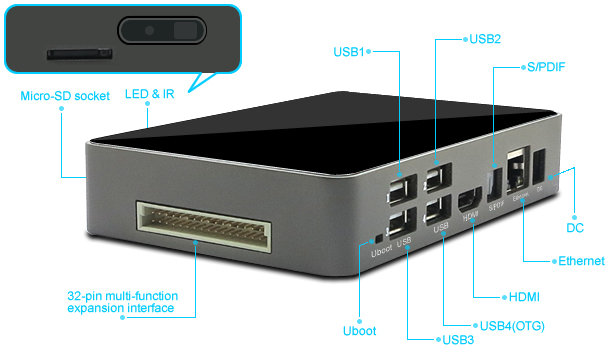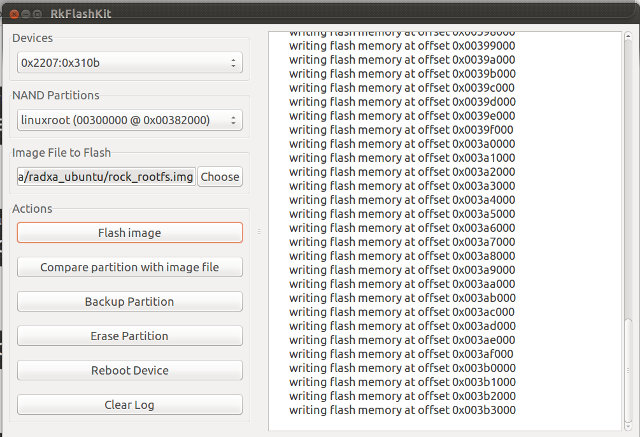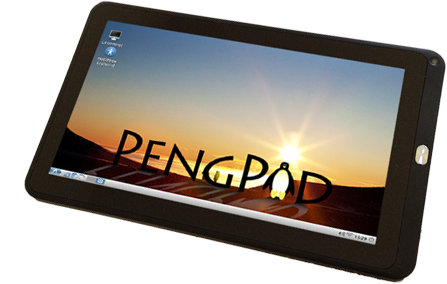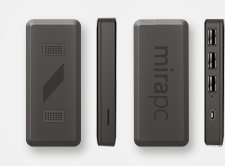ITEAD Studio IBOX is a mini computer powered by AllWinner A20 dual core Cortex A7 processor with 1GB RAM and 4GB Flash, a few USB connectors, Ethernet and video/audio connector. This mini pc can run both Android & Linux, and features a 32-pin connector that allows to connect expansion boards. Let’s have a look at the specifications: SoC- AllWinner A20 dual core ARM Cortex-A7 @ 1 GHz + ARM Mali 400 MP2 System Memory – 1GB DDR3 RAM Storage – 4GB NAND Flash + microsd slot Video Output – HDMI Audio Output – HDMI, optical S/PDIF Connectivity – 10/100M Ethernet USB – 3x USB 2.0 host port, 1x USB OTG port (full size) Expansion – 32-pin proprietary connector with TV OUT, USB, LCD, UART, IR, CSI, SPI, SATA, GPIOS and power signals. Misc – LED , IR sensor, and U-boot button (FEL mode?) Power – 5V/2A 9V/2A Dimensions – 145 x […]
Getting Started with Raxda Rock – How to Generate and Flash Ubuntu Saucy Server and Desktop Images
I’ve already written a guide showing how to build and install Android in Radxa Rock. Today I’m going to build the Linux kernel, generate a Ubuntu server images based latest Ubuntu Linaro server release, flash the image to the NAND flash, and show how to install LXDE or XFCE desktop environment. If you are just interested in installing one of the latest supported images, you can download Android, dual boot (Android/Ubuntu), Ubuntu ALIP, and Router images for Radxa Rock @ http://dl.radxa.com/rock/images/, and skip “build” and “generate” instructions, and just follow the flashing instructions below. All steps in this tutorial will be done in Ubuntu 13.10, and lots of the instructions below follow hwswbits blog and Ubuntu Radxa Wiki. Build the Linux kernel Let’s start by building the Linux kernel. I’m assuming you’ve already install development tools in Ubuntu (e.g. apt-get install build-essentials). You can refer to the list at the beginning […]
PengPod 700 & 1000 – Linux Tablets Based on AllWinner A10
There are plenty of tablet based on AllWinner A10 and A13 processors, but all of them run Android, and you are out of luck if you want to run Linux on your tablet, unless you hack this yourself. But this is about to change as PengPod will launch 2 tablets and 1 mini PC running Linux from NAND flash or micro SD card: PengPod 700 – 7″ tablet with Allwinner A10, 1GB RAM and 8GB Flash PengPod 1000 – 10″ tablet with AllWinner A10, 1GB RAM and 8GB Flash PengStick – AllWinner A10 mini PC with 1GB RAM and 4 GB Flash The table below gives more detailed specifications and comparison of the three devices. Device PengPod1000 PengPod700 PengStick Type Tablet Tablet TV Stick CPU Allwinner A10 AllWinner A10 AllWinner A10 Android 4 4 4 Linux 3.0.42 3.0.42 3.0.42 Screen 10” 7” External Resolution 1024×600 800×480 1080i Ram 1GB 1GB […]
Stella Mira Pocket Console AllWinner A10 mini PC with Built-in Bluetooth and Up to 128 GB Flash
Stella Mira, a new technology startup, has come up with a new Android mini-PC based on AllWinner A10 (how original!) called the Pocket Console (aka MiraPC). What makes it stand apart is that it comes with built-in Bluetooth, has several versions based on the NAND flash size: 8GB, 16GB, 32GB, 64 GB and even 128 GB, and the company plans to release a 3G version in September. The company also provides a dock, the Stella Mira Pocket Dock, that comes pre-loaded with one of supported Linux distributions, without the requiring the knowledge and time to configure microSD card for Linux. The company will provide 4 Linux distributions: Ubuntu 12.04 (Custom build – Ready) Lubuntu 12.04 (Custom build – Ready) Xubuntu 12.04 (Custom build – Final stage of development) Fedora 17 XFCE (Not officially supported, but backed by a large development community) Beside running Linux, the Pocket Console can also “run […]






